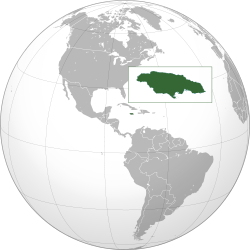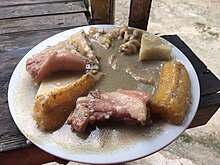The Jamaica Portal
Jamaica (/dʒəˈmeɪkə/ jə-MAY-kə; Jamaican Patois: Jumieka [dʒʌˈmie̯ka]) is an island country in the Caribbean Sea and the West Indies. At 10,990 square kilometres (4,240 sq mi), it is the third largest island—after Cuba and Hispaniola—of the Greater Antilles and the Caribbean. Jamaica lies about 145 km (90 mi) south of Cuba, 191 km (119 mi) west of Hispaniola (the island containing Haiti and the Dominican Republic), and 215 km (134 mi) south-east of the Cayman Islands (a British Overseas Territory). With 2.8 million people,0 Jamaica is the third most populous Anglophone country in the Americas (after the United States and Canada), and the fourth most populous country in the Caribbean. Kingston is the country's capital and largest city. Most Jamaicans are of Sub-Saharan African ancestry, with significant European, East Asian (primarily Chinese), Indian, Lebanese, and mixed-race minorities. Because of a high rate of emigration for work since the 1960s, there is a large Jamaican diaspora, particularly in Canada, the United Kingdom, and the United States. The country has a global influence that belies its small size; it was the birthplace of the Rastafari religion, reggae music (and such associated genres as dub, ska and dancehall), and it is internationally prominent in sports, including cricket, sprinting, and athletics. Jamaica has sometimes been considered the world's least populous cultural superpower. (Full article...) Selected article -Jamaican Patois (/ˈpætwɑː/; locally rendered Patwah and called Jamaican Creole by linguists) is an English-based creole language with West African, Taíno, Irish, Spanish, Hindustani, Portuguese, Chinese, and German influences, spoken primarily in Jamaica and among the Jamaican diaspora. Words or slang from Jamaican Patois can be heard in other Caribbean countries, the United Kingdom and Toronto, Canada. The majority of non-English words in Patois derive from the West African Akan language. It is spoken by the majority of Jamaicans as a native language. Patois developed in the 17th century when enslaved people from West and Central Africa were exposed to, learned, and nativized the vernacular and dialectal language spoken by the slaveholders: British English, Hiberno-English and Scots. Jamaican Creole exists in gradations between more conservative creole forms that are not significantly mutually intelligible with English, and forms virtually identical to Standard English. (Full article...)Did you know (auto-generated)
Selected biography - Portia Lucretia Simpson-Miller ON (born 12 December 1945) is a Jamaican former politician. She served as Prime Minister of Jamaica from March 2006 to September 2007 and again from 5 January 2012 to 3 March 2016. She was the leader of the People's National Party from 2005 to 2017 and the Leader of the Opposition twice, from 2007 to 2012 and from 2016 to 2017. While serving as prime minister, Simpson-Miller retained the positions of Minister of Defence, Development, Information and Sports. She has also served as Minister of Labour, Social Security and Sport, Minister of Tourism and Sports and Minister of Local Government throughout her political career. Following her election win in December 2011, when her party defeated the Jamaica Labour Party, she became the second individual since independence to have served non-consecutive terms as prime minister, the first having been Michael Manley. The People's National Party under her leadership lost the 25 February 2016 general election by only one seat to the Andrew Holness-led Jamaica Labour Party. One political commentator described the poll as "the closest election Jamaica has ever had". Following this defeat, Simpson-Miller stepped down in 2017. (Full article...)General images -The following are images from various Jamaica-related articles on Wikipedia.
This is a Good article, an article that meets a core set of high editorial standards.
Robert Nesta Marley OM (6 February 1945 – 11 May 1981) was a Jamaican reggae singer, guitarist, and songwriter. Considered one of the pioneers of the genre, Marley fused elements of reggae, ska, and rocksteady in his music and was renowned for his distinctive vocal and songwriting style. Marley's contribution to music increased the visibility of Jamaican music worldwide and made him a global figure in popular culture. Over the course of his career, Marley became known as a Rastafarian icon, and he infused his music with a sense of spirituality. He is also considered a global symbol of Jamaican music and culture and identity, and was controversial in his outspoken support for democratic social reforms. He also supported legalisation of cannabis, and advocated for Pan-Africanism. In 1976, Marley survived an assassination attempt in his home, which was believed to be politically motivated. Born in Nine Mile, Jamaica, Marley began his professional musical career in 1963, after forming the group Teenagers with Peter Tosh and Bunny Wailer, which, after several name changes, would become the Wailers. In 1965, the group released its debut studio album, The Wailing Wailers, which included the single "One Love", a reworking of "People Get Ready"; the song was popular worldwide, and established the group as a rising figure in reggae. The Wailers released an additional 11 studio albums, and after signing to Island Records, the band's name became Bob Marley and the Wailers. While initially employing louder instrumentation and singing, the group began engaging in rhythmic-based song construction in the late 1960s and early 1970s, which coincided with Marley's conversion to Rastafari. Around this time, Marley relocated to London, and the group embodied their musical shift with the release of the album The Best of The Wailers (1971). (Full article...)Selected picture -Selected cuisines, dishes and foods -Run down, also referred to as rundown, run dun, rondón, fling-me-far, and fling mi for, is a stew dish in Jamaican cuisine and Tobago cuisine. The traditional Jamaican dish is eaten in several Latin American countries that share a coast with the Caribbean Sea. It consists of a soup made up of reduced coconut milk, with different types of seafood (fish, crabs, small lobsters or shellfish), plantain, yam, tomato, onion, and seasonings. Mackerel and salted mackerel are often used in the dish. Other fish are also used, including locally caught fish, cod, salt cod, shad, other oily fish, red snapper, swordfish, pickled fish, bull pizzle, and cassava. Traditionally, the dish is served with side dishes of dumplings or baked breadfruit. (Full article...)
More did you knowSelected listsTopicsCategoriesRelated portals
WikiProjectsGeographical:
History and Society:
Tasks
Associated WikimediaThe following Wikimedia Foundation sister projects provide more on this subject:
More portals | ||||||||||||





















































